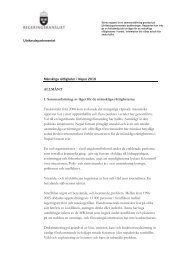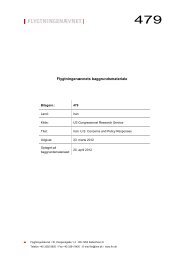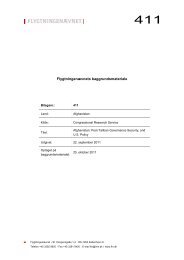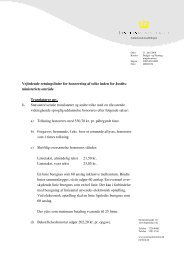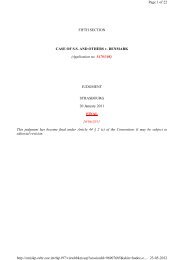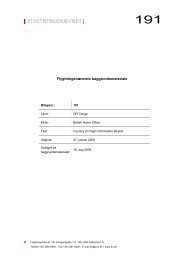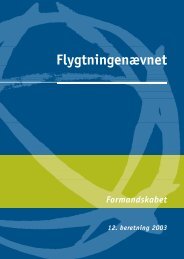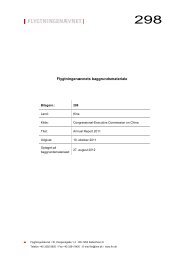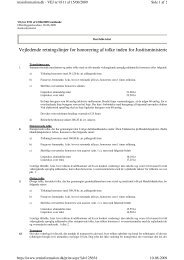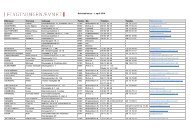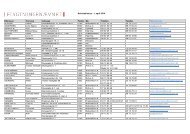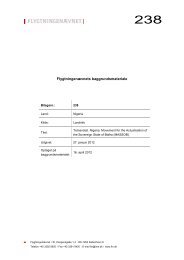Annual Report - National Human Rights Commission
Annual Report - National Human Rights Commission
Annual Report - National Human Rights Commission
You also want an ePaper? Increase the reach of your titles
YUMPU automatically turns print PDFs into web optimized ePapers that Google loves.
Annexure 14<br />
○ ○ ○ ○ ○ ○ ○ ○ ○ ○ ○ ○ ○ ○ ○ ○ ○ ○ ○ ○ ○ ○ ○ ○ ○ ○ ○ ○ ○ ○ ○ ○ ○ ○ ○ ○ ○ ○ ○ ○ ○ ○ ○ ○ ○ ○ ○ ○ ○ ○ ○ ○ ○ ○ ○ ○ ○ ○ ○ ○ ○<br />
○<br />
and the perpetrators of terrorism. Such selective approach leads to double standards. It also<br />
indirectly lends support to terrorists and terrorism. All nations must, therefore, co-operate to<br />
relentlessly and without any compromise fight terrorism. But let me emphasize that in doing so,<br />
the approach should be human, rational and secular. It must be consistent with democratic<br />
principles and the Rule of Law. We need to strike a balance between the liberty of an individual<br />
and the requirements of security of state and sovereignty and integrity of the nation. It requires<br />
respect for the principles of necessity and proportionality. We must avoid a descent into anarchy<br />
– in which the only rule is ‘might is right’ – combating terrorism should not be used as an excuse<br />
to suspend all the rules of international law and domestic civil liberties.<br />
The Acting High <strong>Commission</strong>er for <strong>Human</strong> <strong>Rights</strong>, Mr. Bertrand Ramcharan, in his address<br />
on 15 March 2004 at the opening of the 60 th Session of the <strong>Commission</strong> on <strong>Human</strong> <strong>Rights</strong><br />
observed: “At the end of the day we must all continue to strive for the universal realization<br />
of <strong>Human</strong> <strong>Rights</strong> through constructive cooperation. International cooperation for the effective<br />
protection of human rights is the call of our time.” The <strong>National</strong> <strong>Human</strong> <strong>Rights</strong> <strong>Commission</strong><br />
of India shares the view that sustained cooperation at various levels including at the<br />
international level could go a long way in the protection of human rights and in addressing<br />
the challenges faced by the international community. The <strong>National</strong> <strong>Human</strong> <strong>Rights</strong><br />
<strong>Commission</strong> of India, as the Chair of the Asia Pacific Forum of <strong>National</strong> <strong>Human</strong> <strong>Rights</strong><br />
Institutions in 2003, contributed to this effort. In addition to cooperation at the regional<br />
level, the <strong>Commission</strong> has also taken up bilateral cooperation projects with the <strong>Human</strong><br />
<strong>Rights</strong> <strong>Commission</strong> of Nepal involving technical assistance in Complaints Management<br />
System and investigation techniques.<br />
Recognizing the crucial role of <strong>National</strong> Institutions, the United Nations has involved them<br />
in its efforts to draft a new convention on the rights of persons with disability. The Indian<br />
<strong>Commission</strong>, as Chair of Asia Pacific Forum of <strong>National</strong> <strong>Human</strong> <strong>Rights</strong> Institutions in 2003,<br />
co-hosted an international Workshop of <strong>National</strong> Institutions from Asia Pacific and<br />
Commonwealth Countries between 26 – 29 May 2003 in New Delhi to deliberate on the<br />
rights of the disabled. The Workshop called for a paradigm shift from a welfare-based<br />
approach to a rights-based one. The Workshop concretized a proposal regarding the nature,<br />
structure, principles and elements of the proposed Comprehensive and Integral United<br />
Nations Convention to Promote and Protect the <strong>Rights</strong> of Persons with Disabilities.<br />
This proposal was submitted to the Second Ad Hoc Committee of the United<br />
Nations. There is a need to further develop such cooperation between the <strong>National</strong> Institutions<br />
and the Office of the High <strong>Commission</strong>er for <strong>Human</strong> <strong>Rights</strong>, treaty bodies and other<br />
UN agencies working on human rights issues. The <strong>National</strong> Institutions must be given<br />
their rightful role.<br />
The <strong>National</strong> <strong>Human</strong> <strong>Rights</strong> <strong>Commission</strong> of India, the Canadian <strong>Human</strong> <strong>Rights</strong> <strong>Commission</strong><br />
and the Indira Gandhi <strong>National</strong> Open University have taken up jointly a project on the rights of<br />
<strong>National</strong> <strong>Human</strong> <strong>Rights</strong> <strong>Commission</strong> <strong>Annual</strong> <strong>Report</strong> - 2004-2005<br />
309<br />
AR-Chapter-1-19-10-6-06.p65<br />
329<br />
7/17/06, 6:31 PM



